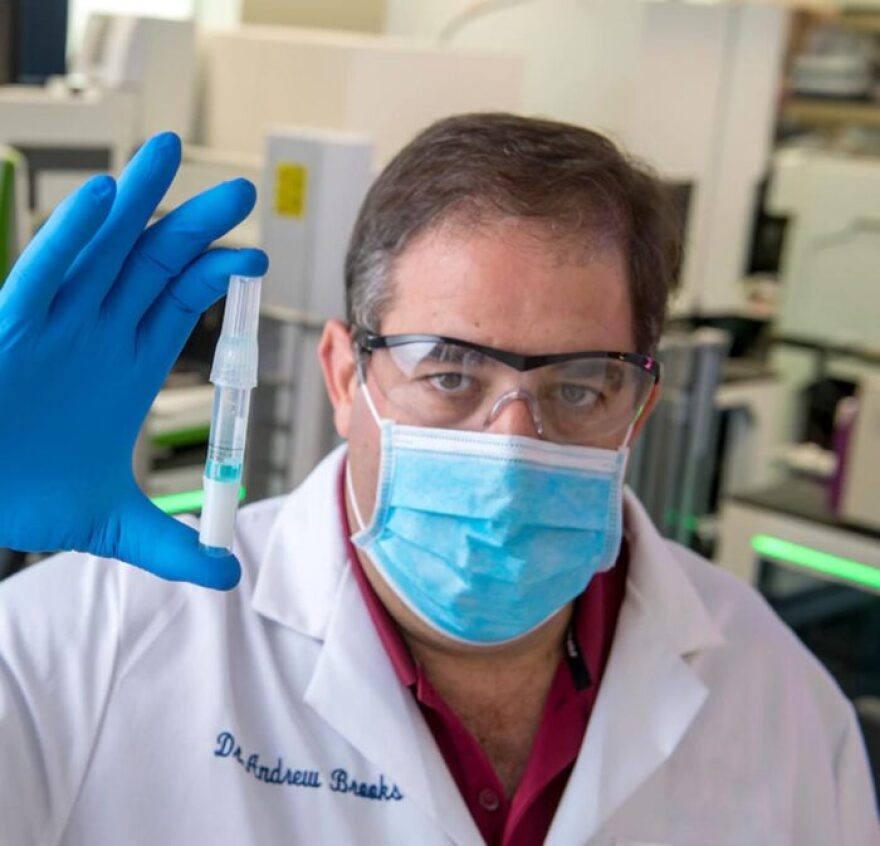On June 15, Idaho Health and Welfare announced any resident could call the state’s 211 healthcare helpline and request a free at-home COVID-19 test kit. With the department’s knowledge that a test would be going to someone already vaccinated and not showing any symptoms of COVID-19 — I dialed up 211 and requested a test. The call took about five minutes, but it was a week before the kit showed up on my front porch.
Staff at the Idaho Cares hotline take the requests by phone and email the information to Health and Welfare staff for processing.
Dr. Christopher Ball is chief of the Idaho Bureau of Laboratories within the Division of Public Health at Idaho Health and Welfare. He said because state agencies are closed on weekends, when people make the request matters.
“So if [callers] get a request in on Friday, it's not going to get processed and shipped out until Monday,” Ball said.
The state has distributed about 350 of these saliva test kits to hotline callers. Officials didn’t know how many have been used.
“I do think we're getting a lot of people that don't have symptoms that want them for that just in case or use them later,” said Sonja Schriever, Public Health Division’s Chief of Community and Environmental Health. “If there are folks that have symptoms and they're ill, they probably need to seek immediate testing versus waiting for the test to arrive.”
The saliva test kits are made by a New Jersey company called Infinity BiologiX LLC, and are one of more than 250 portable tests approved by the Food and Drug Administration for at-home use. Idaho Health and Welfare began using them in December. About 50,000 have already been distributed to health districts, schools and businesses. As testing demand slowed this spring, health officials wanted to provide the option to the general public.
“We purchased quite a few tests and I think that they'll get us through until July of 2022,” Schriever said.
That’s also when the current stock of kits Idaho has in storage expire.
Once the kit arrives and you’re ready, you register online with VAULT Health, the telemedicine company administering the tests. Assuming you haven’t eaten, smoked, chewed gum or drank something other than water in the previous 30 minutes, you begin a video conference with a VAULT Health contractor to make sure you do the test right. The technician who walked me through it on Zoom was in Georgia.
“What you’re going to do is spit right through that funnel until you fill it to the black squiggly line in the middle,” he instructed as I opened the package and began the process.
Generating about two tablespoons of spit is harder than it sounds, but still more pleasant than trying to probe my own nasal cavity.
You combine the spit with some included reagent in a sealed vial, drop it into a plastic Ziploc-style bag and repackage it. The process took about 10 minutes.
The technician, who gave his okay to record our interaction, was working from home. He estimated conducting more than 100 calls in a 12-hour day last fall, mostly with college students. Recently, he's done about 60 each day.
After the call, I dropped the pre-paid UPS pouch in a nearby dropbox, and it went to a lab in New Jersey. My result — negative — arrived by email 30 hours later. The company also reports test results to state Health and Welfare.
Ball said test kits have been distributed to all parts of the state, but most requests have come from the more populated Treasure Valley and panhandle areas. He expects demand for the kits to increase.
“Now that we're seeing the positivity rates start to climb, I would anticipate that we will probably start to see an increase in the frequency of test requests,” he said.
He continued by calling the tests a good tool to have, but “it doesn't solve the problem. It enables you to make good decisions about what public health prevention strategies to put in place. The most effective way to resolve the issue is vaccination.”
The at-home tests cost the state $109 each, $10 less than the over-the-counter cost at vaulthealth.com. The state purchased the kits with CARES Act funding, but does not have plans or funding in place to buy more once the current inventory is gone.



